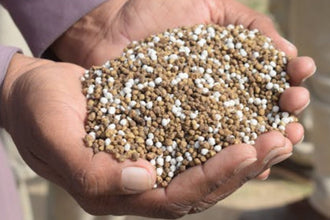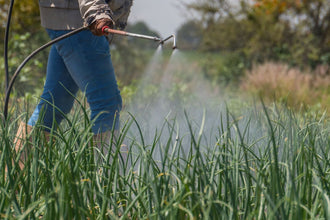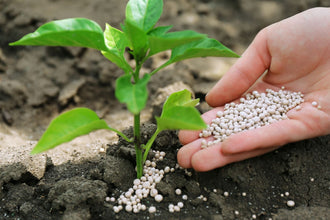
Commercial growers all over America are switching to pelletized chicken manure, and there's good reason for it. This organic fertilizer has become what most big farming operations reach for when they want results that stick around, healthier soil, and better profits down the line.
More and more growers are moving away from synthetic fertilizers to organic choices like pelletized chicken manure. This isn't just about jumping on some trend. Farmers who know their stuff understand that healthy soil pays off in ways that synthetic products just can't touch. You'll see the difference in crop yields, production costs, and how your fields perform year after year.
The Science Behind Superior Performance
Pelletized chicken manure works totally different from synthetic fertilizers, and that matters a lot for commercial operations. Synthetic products hit plants with a big burst of nutrients right away, but plants use it up fast. Pelletized chicken manure feeds both your plants and the tiny organisms in your soil for months.
This slow feeding means nutrients hang around all season long. Plants grab what they need when they need it instead of getting stuffed with food all at once and then going hungry later. Your crops grow more steadily and the quality stays consistent.
The pelletizing process packs nutrients tight while making everything way easier to spread. Regular chicken manure is a pain to handle and you can't get it spread evenly across big fields. The pelletized stuff flows through your spreaders like it should and covers everything uniformly.
Most growers see their soil test numbers improve within the first year. The organic matter starts building up right away, and that creates changes you can actually measure. Your soil holds water better, nutrients don't wash away as much, and the whole system works better.
Economic Benefits That Add Up
Commercial operations watch every penny they spend, and pelletized chicken manure saves money in ways that really matter. Sure, it might cost more per bag than synthetic stuff, but the real savings show up over time.
You don't have to apply it as often, which cuts your labor costs big time. Most synthetic fertilizers need multiple trips across your fields each season. Pelletized chicken manure usually only needs one or two applications. That means less time on the tractor, less fuel burned, and your equipment lasts longer.
Your soil gets better over time, so you need fewer other products. Growers tell us they use less lime, fewer soil conditioners, and sometimes even less pest control stuff as their soil health improves. Those savings add up fast and often beat the extra fertilizer cost within two seasons.
Better water retention means lower irrigation bills in many areas. The organic matter in pelletized chicken manure helps soil hold onto moisture better. You use less water but your plants stay just as healthy.
Storage costs go down too because pellets take up less space than other organic options. You can store more nutrition in the same building space, which matters when you're planning for the whole growing season.
Why Pelletized Chicken Manure Beats Other Organic Options
Commercial growers have lots of organic fertilizer choices, but pelletized chicken manure wins for practical reasons. Compost takes up huge amounts of storage space and you need special equipment to handle it. Liquid organic fertilizers cost a fortune to apply and mess up your schedule.
Pelletized chicken manure stores in regular fertilizer buildings. The pellets don't soak up moisture and fall apart like some organic alternatives that turn into lumpy messes you can't spread.
Your existing equipment works fine with it. Pelletized chicken manure goes through the same spreaders you use for regular granular fertilizer. No new equipment to buy, no extra training for your crew.
The nutrients stay consistent from bag to bag, which beats compost or raw manure by a mile. Every batch has the same nutrition levels, so you can plan your crops and fertilizer schedule without guessing.
The pellets break down at just the right speed too. They don't disappear in the first rain like some products, but they don't sit there doing nothing either. Plants get fed all season long.
Soil Health Improvements Commercial Growers Actually See
The soil health benefits of pelletized chicken manure show up in ways you can measure and track. Organic matter levels go up steadily when you use it regularly. Most growers see gains of about 0.1 to 0.3 percentage points each year.
The tiny critters in your soil love this stuff. These helpful microorganisms break down organic matter, release nutrients slowly, and build soil structure that lasts for years. Lots of growers say their soil works easier and doesn't pack down as much after two or three seasons.
 Water soaks into the ground better as soil structure improves. This helps whether you're dealing with heavy clay that won't drain or sandy ground that won't hold water. Clay soils let water through better while sandy soils hang onto moisture and nutrients.
Water soaks into the ground better as soil structure improves. This helps whether you're dealing with heavy clay that won't drain or sandy ground that won't hold water. Clay soils let water through better while sandy soils hang onto moisture and nutrients.
Plant roots grow stronger in soil with more organic matter. Better roots help plants find nutrients and water more easily. Your crops handle stress better during tough weather conditions.
You'll notice your fields look different too. The soil color gets darker as organic matter builds up. It smells better and feels different in your hands. These might seem like small things, but they tell you the soil biology is working right.
Application Methods That Work for Large Operations
Commercial growers need fertilizer that fits into how they already do things. Pelletized chicken manure works with different application methods, from broadcasting it everywhere to putting it right where crop rows will go.
Spreading it before planting works great for most crops. This gives time for nutrients to start releasing before you plant. The pellets break down slowly, feeding plants all season without creating problems during important growth times.
Side dressing during the growing season gives extra nutrition to heavy feeding crops. You can apply pellets between crop rows using regular cultivation equipment. This works really well for corn, vegetables, and other row crops.
Broadcasting followed by working it into the soil suits crops with wide spacing. This spreads nutrients evenly across the whole growing area and works great for perennial crops or when preparing fields for small grains.
The timing matters less than with synthetic fertilizers. You have more flexibility in when you apply pelletized chicken manure because it releases nutrients gradually instead of all at once.
Storage and Handling Advantages
Large operations need fertilizer that stores well and handles easily year round. Pelletized chicken manure does both things better than most organic options.
Bulk storage takes less space than the same amount of compost or raw organic stuff. The pellets stack well and don't settle much, so they flow the same way from the first day to the last.
They handle moisture pretty well too. Good pellets keep their shape even when it's humid, unlike some organic fertilizers that turn into unusable mush if they get damp.
Your loading and transport systems work fine with pelletized chicken manure. If your equipment handles granular fertilizer, it handles this stuff too. No modifications needed, no special procedures to learn.
The pellets don't create dust clouds like some products either. This makes handling safer and more pleasant for your crew. Less dust also means less product loss during handling and application.
Meeting Organic Certification Requirements
Commercial organic growers have to follow strict rules about fertilizer inputs. Pelletized chicken manure from certified sources meets these requirements while giving excellent crop nutrition.
OMRI listing means the product follows organic standards. Certified sources give you the paperwork needed for organic inspections, making record keeping much easier.
Proper composting and pelletizing kills pathogens, which takes care of food safety concerns. This matters a lot if you grow fresh vegetables or fruits that people eat raw.
No synthetic residues stick around because pelletized chicken manure breaks down completely in soil. You don't have to worry about leftover chemicals affecting future crops or soil biology.
The application rates and timing requirements fit well with organic farming practices. You're building soil health while feeding current crops, which is exactly what organic certification programs want to see.
The Bottom Line for Commercial Success
Commercial growers pick pelletized chicken manure because it works for their operations. Steady crop performance, better soil health, and lower costs over time make this organic fertilizer a smart business choice.
Switching from synthetic fertilizers takes some getting used to with timing and application rates, but most growers figure it out quickly. The benefits show up in the first growing season and keep getting better as soil health improves.
Smart commercial growers know that farming practices that last support long term profits. Pelletized chicken manure gives you a practical way to build soil health while keeping the yields and quality that commercial success needs.
More and more commercial operations make this switch every year, proving that pelletized chicken manure works in real farming situations. These growers found fertilizer that takes care of immediate crop needs and long term soil management goals at the same time.
The switch makes sense financially, practically, and environmentally. Your soil gets better, your crops perform more consistently, and your input costs often go down over time. That's the kind of win that keeps commercial operations profitable year after year.
Why Fancy Chicken Stands Out Among Pelletized Options
The Perfect NPK Balance for Commercial Success
Fancy Chicken's 4-2.5-2 NPK formula gives commercial growers exactly what their crops need without overdoing it. This balanced nutrition supports steady growth throughout the season while building soil health that lasts for years.
The nitrogen level feeds plants consistently without creating the boom and bust cycles that synthetic fertilizers cause. Phosphorus supports strong root development and better flowering, which translates directly to higher yields. The potassium strengthens plant cell walls and helps crops handle weather stress better.
Commercial growers who switch to Fancy Chicken often see more uniform crop development across their fields. Plants grow at steady rates instead of growing too fast early in the season and then struggling later when synthetic fertilizers run out.
Premium Quality That Commercial Operations Demand
Fancy Chicken sources their raw materials from sustainably raised chickens, which makes a real difference in fertilizer quality. The composting and pelletizing process creates uniform pellets that flow through equipment smoothly and break down at consistent rates.
Every batch gets tested to make sure the nutrient levels stay the same from load to load. This reliability matters a lot when you're planning fertilizer applications across hundreds or thousands of acres. You know exactly what nutrition you're putting down.
The pellets hold their shape well during storage and transport. Commercial growers don't have to worry about product breaking down before they use it or creating dust problems during handling.
Soil Microbiology Benefits That Pay Off Long Term
Fancy Chicken's organic formula feeds beneficial soil microorganisms that synthetic fertilizers can't support. These tiny organisms break down organic matter, release nutrients slowly, and build soil structure that improves water retention and root development.
Key microbial benefits include:
-
Better nutrient cycling that reduces fertilizer needs over time
-
Improved soil structure that prevents compaction problems
-
Natural disease suppression that protects crop health
-
Enhanced water infiltration and retention capabilities
Commercial growers using Fancy Chicken report soil that works easier and stays productive even during challenging weather conditions. The biological activity creates soil structure improvements you can actually see and measure.
Cost Analysis That Makes Business Sense
Fancy Chicken delivers value that shows up in your bottom line over time. While the per-bag cost might be higher than synthetic options, the total growing costs often drop within two seasons.
Application savings add up fast because you use less product per acre and apply it fewer times per season. Most commercial operations cut their fertilizer application trips in half, saving fue, labor, and equipment wear.
Soil improvements mean you need fewer additional products. Growers using Fancy Chicken regularly report using less lime, fewer soil conditioners, and sometimes even reduced pest management costs as soil health improves.
The slow-release nutrition also reduces crop stress, which often leads to better quality produce that brings higher market prices. This quality improvement frequently more than pays for the fertilizer cost difference.
Your Next Step Toward Smarter Farming
Commercial growers who make the switch to Fancy Chicken discover that better soil health and consistent yields aren't just nice ideas – they're practical business advantages that improve profitability year after year. The combination of reliable nutrition, soil building benefits, and long-term cost savings makes Fancy Chicken the organic fertilizer choice that works for serious farming operations. Start building the soil foundation your crops deserve while keeping the consistent performance your business needs.








